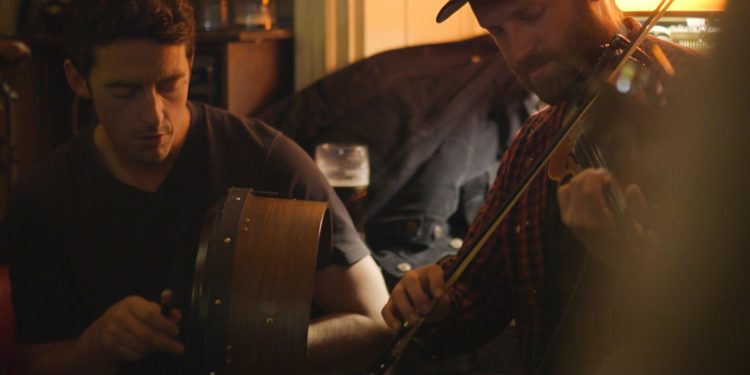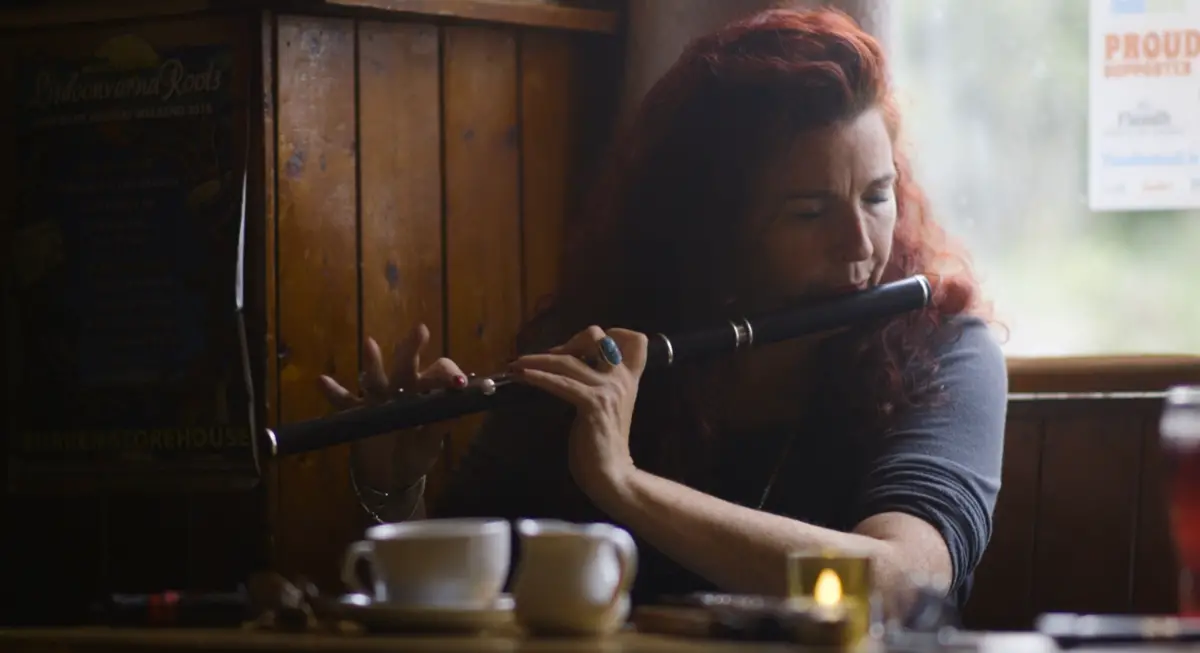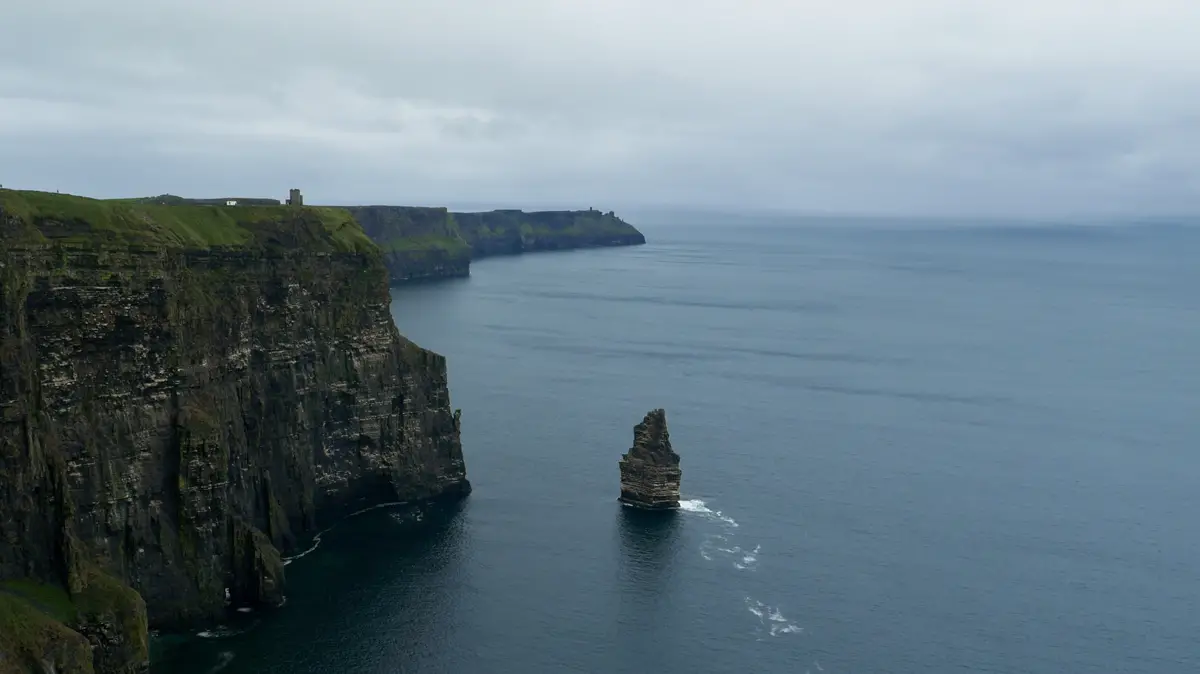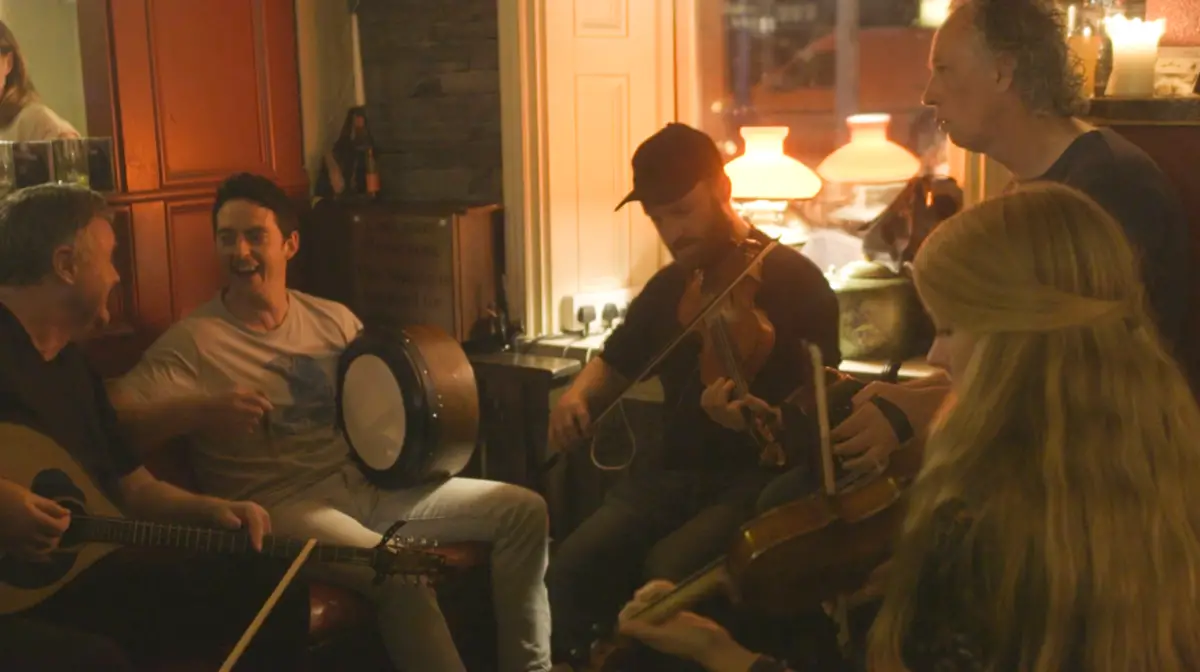The Job of Songs (2023) – Film Review

By Elizabeth Stanforth-Sharpe
The Job of Songs, produced by Lila Schmitz, Fengyi Xu, and Anika Kan Grevstad, is an intimately beautiful documentary film that takes us right to the heart of Doolin, an unspoiled coastal village in County Clare, on Ireland’s west coast, where the community of musicians explore what it means to exist in the old music, the long-standing tradition, and find community through the strumming of a guitar, beating of a bodhran, or sharing of a song.
Prior to the 1950s, Doolin was officially recognised as part of the West Coast Gaeltacht, one of the districts of Ireland where the Irish language was the predominant vernacular. It was a close-knit community where doors were always open, the seasons of the year were marked with traditional rituals such as ‘Hunting the wren’, any strangers passing through with their sacks on their backs would be made welcome – and there was always music. One would bring spoons, another a penny whistle, another a concertina; the furniture would be pushed to the side of the room, and tunes would be played and danced to, and because it happened in the homes, all generations and sexes would be a part of it.
Tunes and lyrics were passed down orally, and travelling pipers wandered the country teaching new compositions, so the repertoires of individual musicians grew. At a time when Ireland’s nearest neighbours regarded them as an illiterate country, there were bards roaming the country singing songs that had upwards of 300 verses.
Katie Theasby, one of the singers and musicians featured, remarks, “We’re only carrying the music; it doesn’t belong to us. It belongs to everybody”, and Christy Mc Namara adds, “When we were conquered by the English, we lost our language, but we never lost our music. I think it’s the one thing in Irish culture that links us directly to our ancestors. Immigration has been a big factor in the lives of Irish people, really from the 1840s with what they call the Great Famine’. There was a huge exodus of people. When people had nothing, they carried it in their heads; even if they hadn’t instruments, they still had the music.”
Gradually, the music moved out from the impromptu sessions in kitchens and living rooms, and into the pubs, and, for a time, the women and children became a lesser part of it, but as the world moved on, bars were opened up to both sexes, and Doolin developed its own music room where everyone was, and is, welcomed.
“Major revival”
Adam Shapiro, originally from Cape Town found Irish music fascinating and decided, “I want to do that, travelled to Doolin and has now been there for twenty years. He comments, “The session at its core is about being with other people… it’s just about ten people having fun together set around the tables, and you can play with any one at any time, even if you’ve never met them… anyone can bring something. It could be the worst playing you’ve ever heard, but it could be just at the right time, and it can be in the right mood, and it can just make everyone smile.”
Brothers Micho, Gussie and Packie Russell were local lads, sons of a mum who played the concertina and a father who was a sean-nós singer (unaccompanied traditional Irish music in the Irish language). All the brothers were musicians, but perhaps most well-known was Micho, who was an award-winning tin whistle player, but also played the simple system flute and was a collector of music and folklore. When traditional Irish music had a major revival in the 1960s, he got the opportunity to perform across the world, though always mindful of his home, and the trio made Doolin famous for its music.
Hippies began to descend upon this tiny village in their droves, to pitch their tents and listen to the sessions. They came for the music but also discovered a place that was incredibly beautiful. It was the beginning of tourism in the area, and many who came never returned home. The locals were wise to the economic potential, and the hotels, cafés and tea-towels soon followed. In the 1990s, the authorities opened a visitor centre for the Cliffs of Moher, to the South of the town, and it became the film location for several blockbusters, drawing even more crowds.
Barry Moore, originally from Newbridge, County Kildare, heard about the village of Doolin in 1974, and on August Bank Holiday he pitched his tent, with four or five mates, behind O’Connor’s pub. He was nineteen, music and songs had already been a part of his life, but arriving at a place where the whole community was soaked in, and lived for, the music, was mind-blowing. It changed his life. He moved to the village, changed his name to Luka Bloom, and toured Germany with the Russell brothers when he was twenty-one. Micho, particularly, nurtured Luka’s stage career. He has been there for over forty years now, and throughout the film, it is Luka’s wise words that tell most emphatically the importance of the traditional songs being preserved.
It is Bloom who provides the title of the film; “Sometimes, something in the emotion of the song makes a person go ‘UH’ and cry even when they’re hearing it for the first time. For example, a song about emigration; probably five or six there are listening to a song that is describing their great grandmother’s experience. They close their eyes, connecting with the song; re-living. It’s what I call the job of songs. The job of songs can sometimes be to entertain, but it’s this, this thing of giving people who don’t have songs permission to feel things that are deeply ingrained in them that they don’t necessarily understand.”
“Passed down”
Eoin O’Neill presents Clare FM, where he is witness to listeners from all over the world; in the main, Irish descendants of those who left in the Great Famine, who want to remain connected to their roots and its music. Traditional songs such as ‘Spancil Hill’ have evolved with further verses added to reflect the changed circumstances of those who left…
‘Then the cock he crew in the morning
He crew both loud and shrill
And I awoke in California,
Many miles from Spancil Hill.’
And still the songs are being written. Bloom’s brother and his family emigrated to America in 1984, and whilst today’s technology and transport doesn’t mean that separation is for ever, he says, “I tapped into a feeling of generations ago. One hundred years ago, when you waved goodbye to someone you were never going to see them again. I felt that.” In response he wrote ‘City of Chicago’…
‘1847 was the year it all began
Deadly pains of hunger
Drove a million from this land
They journeyed not for glory
Their motive wasn’t greed
A voyage of survival
Far across the stormy seas.
To the City of Chicago
As the evening shadows fall
There are people dreaming
Of the hills of Donegal. ‘
Bloom’s song has now entered the canon of Irish music. Kieran O’Connell relates how it used to be his favourite song as a child and can’t quite believe he’s now sat in the kitchen of the writer. The songs have endured, being adapted, and added to all the time.
Whilst songs are still passed down orally, the musicians also embrace the opportunity to record their songs. Katie Theasby grew up with the Irish scene – her father, Paul Theasby, originally from Yorkshire but settled in County Clare, was an established musician – and Katie herself is now an established recording artist, musician, and singer. She too has added to the line of songs with hauntingly beautiful lyrics such as, as ‘I Remember You Singing’, written in memory of her parents,
‘I remember you singing this song Ma,
I remember how you blushed when you smiled
Love has a way of never letting go
See the teardrops, they’re filling my eyes
I remember the day my mother passed on
My father had gone just a while
I sat in the church and I listened to all
From a distance I heard this old song.
I wonder if he’s teasing you now Ma
I wonder if he’s holding your hand … ‘
Anne Rynne remarks that truths can be told in song that couldn’t be uttered in conversation, giving the example of a song about refugees being held in Direct Provision, sometimes for as long as five years, until their papers are sorted – ‘Release me from Provision, let me realise my vision…’
As proud as the musicians of Doolin are of their heritage, their music, and the way tradition has evolved and continues, there’s a thread of melancholy running through the film that it’s hard to ignore. A sad sense that all of this has come at a cost.
“Individual stories to tell”
Luka Bloom and his sister, Anne Rynne, reflect that whilst tourism is good, it’s now possible for people to take a coach trip from Dublin to Doolin, go to the gallery that tells of the history of the music, listen to a piped version, before haring off to see the Cliffs of Mohar to take a few pictures, then get back on the coach to be back in Dublin for teatime. They may not even talk to an Irish person but believe that they have done the West Coast of Ireland. Bloom’s wisdom rings out, “For me, part of the beauty of life is waiting. I think that one of the sadnesses about life today is that there’s an absence of waiting. Because the inability to wait is absolutely detrimental to growth; the inability to just sit and be. We’re so busy experiencing all the time, and challenging ourselves, and achieving, that I think we miss out on sunsets, we miss out on a bird that just happens to be there… we are complicit in this race to… what? For what goal? For what achievements.”
O’ Neill says, “You can live in the past, but it’s boring. And useless’, and songwriter Kieran O’Connell puts it like this, “Musicians are very sensitive creatures. Artists are always hiding something, aren’t they?”.
It slowly transpires that there is alcohol abuse, depression, mental health issues, suicide, and loneliness within the Doolin community. All have their individual stories to tell. Katie Theasby longs to vitalize her music yet struggles with self-doubt, single motherhood, and depression. Each of them grapples with their own demons: fighting their fears of putting themselves out there, coping with the changes that tourism has brought to their community, and dreaming of writing the next ballad that will fill the pubs for hundreds of years. Opening the Cliffs of Mohar may have brought needed economy, but all know someone who has lost their life jumping from those cliffs, and all know someone touched by loss.
Ironically, they concur that their favourite songs are the sad songs. The music, the lyrics, and the sadness are in their DNA.
The Director of Photography, Anika Kan Grevstad, has done a magnificent work on The Job of Songs, capturing the stunning scenery of the area, but also taking the viewer into the public music arenas and the deeply personal sharings with equal integrity.
In 2022, The Job of Songs deservedly won ‘Best International Documentary’ at Galway Film Fleadh. It is now available on UK digital download.












